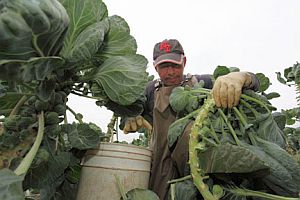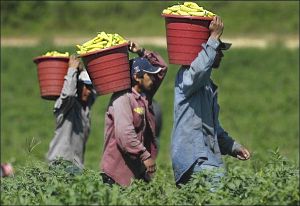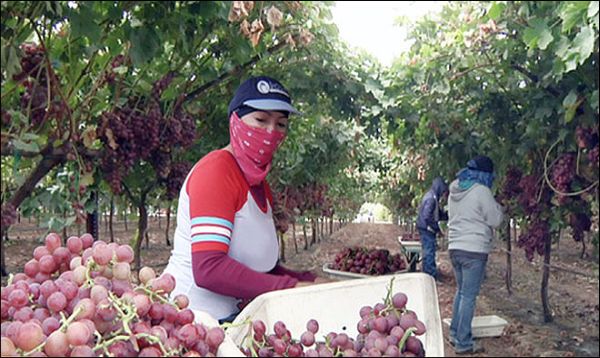Bakersfield, California ó Plagued for years with a lack of water, growers across California are now facing a new kind of drought. A labor shortage.
"That's one of the things that happened this year. Our crops were early and our workers were not early," said Joe Del Bosque, a farmer in Firebaugh, the heartland of Fresno County. "The people were still trying to get across the border. We just did not have enough labor to get our crops picked in that time period and we lost some of our crop."
Del Bosque said he lost $140,000 in just a couple of days during his cantaloupe season, as the fruit sat unpicked for just two more days than normal.
"The asparagus," Del Bosque said, "we had to cut our season short because we didn't have enough workers. We actually stopped two or three days before the end of the season. Again, I don't have the numbers here, but it was probably in the tens of thousands."
 |
Fields across California are facing a 20 percent decrease in labor over the last several years. Del Bosque said the shortage is caused by several different factors.
He said aging hurts growers because the younger generations are not as likely to want to work in the fields. He also blames a broken immigration system that doesnít allow his laborers to freely travel between Mexico and California without running into trouble at the border.
"We've had many of our workers for many years. ... We've invested a lot of money into them by training them, teaching them," said the farmer who is now joining many growers across California in asking for change in the ongoing debate on immigration reform.
"It's really getting critical for us to get this thing fixed because we're operating somewhat in limbo," he said. "I know that reinforcing the borders is going to be more restrictive on our labor, so I would hope that before we start our next growing season, we have something working."
Growers across the US are now calling for immigration reform because of the shortage. Many of them are represented by "Western Growers," an international association that works with about half of the nationís fruit and vegetable suppliers.
"Since 1986, we haven't had any real immigration reform, and yet we know that 11 million people have come into this country," said Jason Resnick, vice president and counsel at Western Growers. "Employers hire them because they have to - because they need them. And the workers need the job. They come here for an opportunity. They'd like to be able to come here to work and then go home after they're done."
Resnick also gave other reasons to the decreasing number of workers.
"We're seeing a negative migration. More people are leaving the United States to return to Mexico than are coming up," Resnick said. "There's more opportunities in Mexico and there is a declining birth rate there. Education is increasing there, so we don't see our labor pool expanding. It's actually contracting."
 |
"Bakersfield is a tremendous agricultural community, and if we can't pick the crops because we don't have an adequate labor force, that economy is going to dwindle," Resnick added.
One of the main issues of the labor shortage is produce prices, which many growers say will rise to a point that most Americans wonít be willing to pay. That could cause an increase in produce imports from places like Mexico and South America.
Joe Garcia, CEO of Jaguar Farm Labor Contracting, said he and many growers are resorting to hiring women for traditionally male jobs.
"The women are increasing in our workforce, mostly in the northern area. Women were not part of the workforce until recently," Garcia said. "Wine grapes, you'd see one crew of women tying and that's about it, and then the men would do all the rest of the labor year-round. Now, you're seeing women in the harvest at night, doing day jobs and having year-round work."
Garcia, as well as Del Bosque, and Resnick, also said Americans are not willing to do the jobs, although many of growers are paying record-high wages, some as high as $13 per hour, to compete with other growers for labor.
"United States citizens come out to the field. In the past year, we've probably had 15-20 apply in the Napa Valley - we have two left," Garcia said.
Del Bosque said he faces the same problem.
"Most of them don't last very long," he said. "They'll come out to work for about three days and they'll quit and go look for something else."
Original Story


